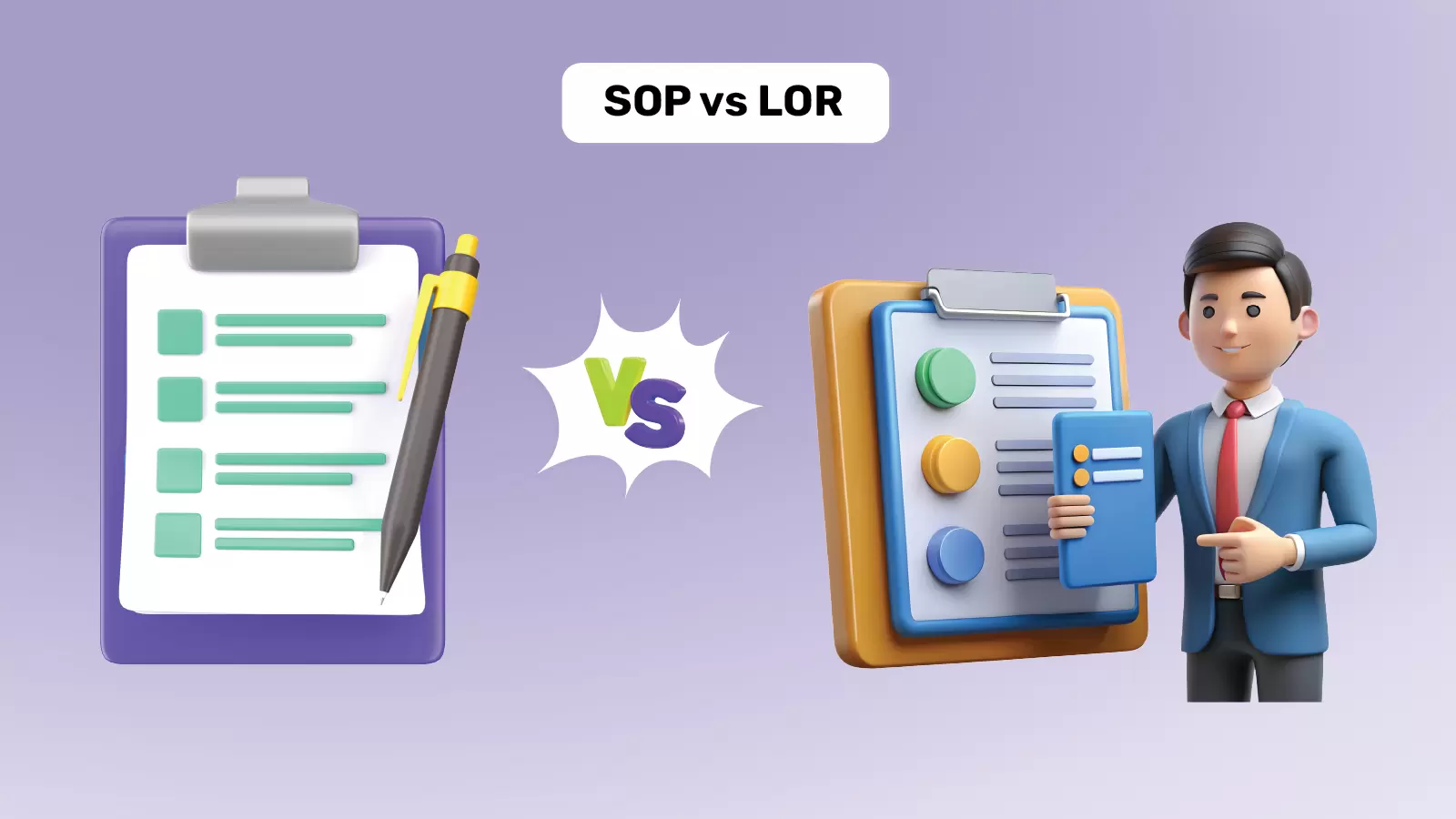30 Apr 2024 | What is the Difference Between SOP and LOR?
0
978
Introduction
As far as the applications for universities, whether academic or professional, both have two most dreaded documents, i.e. SOP and LOR. Both are core to application success, but they serve different purposes, different content, and different perspectives. The SOP vs LOR differences can be leveraged in your applications to make them more impactful, so check this complete Guide. Knowing the slight variation in statement of purpose vs letter of recommendation will help you set yourself up for your success, may it be to get admitted or to get your dream job!
What is a Statement of Purpose (SOP)
An SOP is essentially a personal essay penned by the applicant, who tries to highlight their academic and professional journey, aspirations, and motivations. It will be a story that describes how and why the applicant is the perfect fit for the opportunity they're pursuing.
Key Features of an SOP:
- Personal Voice: An SOP is a personal approach in which the applicants introduce themselves and their goals in their own words.
- Narrative Structure: It is not just a walk through your biodata but creates an engaging story using your history, dreams, and goals to immerse the reader in the picture of what you are.
- Alignment with Goals: The SOP describes the fit between the program, institution/organization, or job and the applicant's short—and long-term aspirations.
How to Craft a Winning SOP:
- Engaging Introduction: Start with an impactful hook that captures attention and sets the tone for the essay.
- Personal Narrative: Highlight experiences, achievements, and challenges that shaped your academic and professional journey.
- Academic and Career Goals: Clearly articulate your short-term and long-term objectives and how the opportunity aligns with them.
- Showcasing Strengths: Emphasize unique skills, achievements, and qualities that make you an ideal candidate.
- Value Addition: Explain how you will contribute to the institution or organization.
- Conclusive Recap: Summarize key points, reaffirming your motivation and enthusiasm.
Example: Imagine you're applying for a master's program in data science. Your SOP should detail your interest in the field, relevant projects or coursework, career aspirations, and how the program aligns with your goals.
What is a Letter of Recommendation (LOR)
An LOR is a document written by a professor, supervisor, or employer who has worked closely with the applicant. It provides an external evaluation of the applicant's skills, character, and potential, offering credibility to their claims.
Key Features of an LOR:
- Objective Perspective: Unlike an SOP, a LOR offers an external, unbiased assessment of the applicant.
- Endorsement: It validates the applicant's achievements, skills, and suitability for the opportunity.
- Relationship-Based: The content is based on the recommender's direct experience with the applicant.
Read More: How to Make an Impressive Letter of Recommendation (LOR)
How to Secure an Effective LOR:
- Choose the Right Recommender: Select someone who knows your work well and can provide specific examples of your abilities and achievements.
- Provide Context: Share details about the program or position you're applying for and any specific qualities or experiences you'd like highlighted.
- Timely Request: Give the recommender sufficient time to write a thoughtful letter.
- Express Gratitude: Thank your recommender for their effort and support after submission.
Example: If you're applying for an MBA, a professional LOR from your immediate supervisor detailing your leadership skills and project achievements can strengthen your application.

SOP vs LOR Comparison: Key Differences
Understanding the differences between SOP and LOR is essential for leveraging these documents effectively.
|
Aspect |
SOP |
LOR |
|
Perspective |
This is written by the applicant & reflect personal insights. |
Written by a recommender, offering an external perspective. |
|
Purpose |
Showcases motivations, qualifications & goals. |
Endorse the applicant’s skills & character. |
|
Tone |
Subjective & Reflective. |
Objective & factual. |
|
Content |
Details achievements, aspirations, & value addition. |
Validates achievements & provides testimonials. |
|
Focus |
Emphasizes future goals & potential. |
Highlights past accomplishments & abilities. |
Fun Question: If you were writing an SOP, which story or experience would you highlight to make yourself stand out?
Types of Letters of Recommendation (LORs)
Academic LOR
An Academic LOR is provided by a professor or teacher who has directly interacted with the applicant in an educational setting.
- Purpose: Highlights academic achievements, skills, and contributions.
- Ideal For: Undergraduate and graduate program applications.
- Content: Evaluate the applicant's intellectual curiosity, performance, and potential for academic success.
Professional LOR
A Professional LOR is written by an employer or supervisor who can attest to the applicant's professional abilities and work ethic.
- Purpose: Validates skills like teamwork, leadership, and problem-solving.
- Ideal For: Applications for master's programs, MBAs, or job roles.
- Content: Focuses on the applicant's performance in a professional environment and their ability to handle real-world challenges.
Importance of SOP and LOR in Applications
Why is an SOP Important?
- Personal Narrative: Offers insights into the applicant's personality, motivations, and aspirations.
- Differentiation: Helps applicants stand out by showcasing their unique stories and strengths.
- Goal Alignment: Demonstrates how the opportunity aligns with the applicant's ambitions.
Why is an LOR Important?
- Credibility: Provides an unbiased endorsement of the applicant's claims.
- Validation: Reinforces the applicant's suitability through external testimony.
- Character Assessment: Highlights qualities like leadership, teamwork, and integrity.
Writing Tips for SOP and LOR
Tips for Crafting an Effective SOP:
- Start with a compelling introduction that grabs attention.
- Use specific examples to illustrate your achievements and goals.
- Tailor the SOP to the program or job you're applying for.
- Avoid clichés and focus on authenticity.
- Edit and proofread thoroughly for clarity and impact.
Tips for Securing a Strong LOR:
- Approach recommenders well in advance to allow ample time.
- Please provide them with relevant information about your goals and achievements.
- Maintain a professional relationship with recommenders for future opportunities.
Punch Line: What do you think is more challenging—writing an SOP or asking for an LOR?
Conclusion
SOPs and LORs difference lies in their purposes and come from different perspectives, yet both are integral to a solid application. Even though statement of purpose and letter of recommendation have their own respective roles, they actually complement each other to demonstrate your capability. Your story and your dreams are in your SOP, and your LOR is the external endorsement that corroborates your claims. Combined, they depict a holistic understanding of your capabilities and dreams.
For more assistance please visit us study abroad consultancy, and avail of our wide range of services for students on destinations like study in USA, study in UK, study in Canada, study in Australia, study in ireland and many more country.
FAQs
Q1. Can both SOP and LOR be submitted for an application?
Ans. Yes, both documents are needed in most applications. The SOP is where you write your dreams and interests, and the LOR is logistical proof.
Q2. Is it acceptable to draft one's own LOR?
Ans. No, because you want to maintain objectivity, a LOR should come from a recommender.
Q3. How many LORs are typically required?
Ans. According to the application guidelines, most programs require 2-3 LORs.
Q4. What makes an SOP stand out?
Ans. The best SOPs are clearly structured, tell an authentic story, and align well with the opportunity.
Q5. How should I choose my LOR recommenders?
Ans. Choose people who are very familiar with your work and can give specific positive examples.
All set to build your fantastic application? Concentrate on a brilliant SOP and powerful LORs, and you can rise above the rest in the games of higher education and jobs.




